Eros Love Meaning in the Bible: Passion and Affection
In Christian theology, eros represents passionate and romantic love, stemming from the Greek concept but not explicitly named in the Bible. We see its essence in the Song of Solomon‘s poetic celebration of romantic love and the story of Isaac and Rebekah’s divinely guided union.
Eros highlights God’s intent for marriage and intimate relationships, emphasizing a blend of emotional, spiritual, and physical connection. This love fosters unity and mirrors divine blessings in human bonds, challenging us to align our passionate desires with God’s teachings.
To grasp the full depth of eros in biblical context, one must explore its spiritual implications and scriptural references.

Eros Love Meaning in the Bible: Romantic Love, Marriage, and Spiritual Union
| Aspect | Biblical Meaning |
|---|---|
| Romantic & Passionate Love | Eros love refers to romantic, passionate love between individuals, often encompassing physical attraction and desire. Although the word “eros” is not explicitly used in the Bible, this form of love is represented in the attraction between couples (Song of Solomon 1:2-4). |
| God-Ordained Expression | Eros is seen as a God-ordained form of love within the context of marriage, where physical intimacy is designed to strengthen the bond between husband and wife (Genesis 2:24). |
| Symbol of Deeper Union | The Bible uses eros love to symbolize the deeper union and intimate connection, highlighting how love involves body, mind, and spirit, fostering oneness (Ephesians 5:31-32). |
| Danger of Misuse | While eros love is a gift, the Bible also warns against its misuse outside of marriage, as it can lead to lust, temptation, and destructive behavior (1 Corinthians 6:18-20). |
| Expression of Joy & Delight | In the proper context, eros love is celebrated as an expression of joy, delight, and mutual pleasure, emphasizing the importance of love and affection in a relationship (Proverbs 5:18-19). |
Understanding Eros

Understanding Eros requires an investigation of its roots in ancient Greek culture and how it contrasts with other forms of love mentioned in the Bible.
Eros, typically associated with romantic and passionate love, isn’t explicitly named in the Bible. Instead, Scriptures focus on agape (unconditional love), philia (brotherly love), and storge (familial love). These biblical forms highlight selflessness and community over personal desire.
When we probe into Eros, we see a love that can be both profound and consuming, often driven by physical attraction and emotional intensity.
It’s crucial to understand how Eros fits within the broader theological framework, allowing us to serve others better by appreciating the diverse expressions of love that shape human relationships.
Eros in Ancient Greek Culture
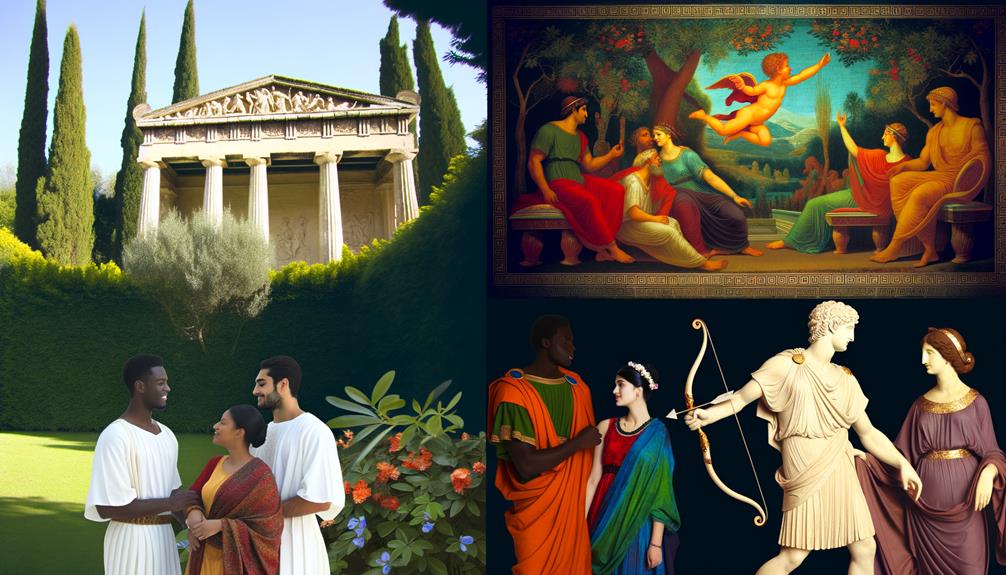
When I consider Eros in Ancient Greek culture, I see a multifaceted concept that influenced mythology, literature, and human desire profoundly.
Eros, personified as a powerful deity, not only shaped relationships but also drove narratives in works by poets like Hesiod and Sappho.
This portrayal of passionate love raises theological questions about how such intense emotions align with biblical teachings on love.
Mythological Significance of Eros
In ancient Greek culture, Eros wasn’t merely a symbol of romantic love but a powerful deity embodying the primal force of attraction and creation. Eros, often depicted as a winged youth, played a significant role in the cosmos and human experiences.
His mythological significance can be seen in various aspects:
- Cosmic Order: Eros was considered one of the primordial gods, vital in bringing order out of chaos.
- Creative Energy: He embodied the creative spark that ignites life and perpetuates existence.
Understanding Eros through this lens provides a deeper theological context, emphasizing his role in shaping the world and nurturing relationships, hence inspiring us to serve others with love and creativity.
Eros in Literature
Examining the mythological significance of Eros, we see that ancient Greek literature richly illustrates his multifaceted influence on both gods and mortals.
In texts like Hesiod’s “Theogony” and Homer’s “Iliad,” Eros isn’t just a deity of romantic love but also a cosmic force compelling creation and binding relationships.
For instance, in Sappho’s poetry, Eros is depicted as both delightful and destructive, highlighting its power to transform lives. This duality evokes theological reflections on the nature of divine love and human passion.
As I explore these ancient texts, I’m struck by how Eros challenges individuals to understand love’s profound complexities and its potential for both harmony and chaos, urging us to serve others with deep, empathetic insight.
Eros and Human Desire
Delving into the heart of ancient Greek culture, I find that Eros isn’t merely a symbol of romantic attraction but a profound representation of human desire and its intrinsic connection to the divine.
Eros was seen as a powerful force that could inspire:
- Creation: sparking artistic and intellectual endeavors.
- Transformation: leading individuals toward personal and spiritual growth.
In this context, Eros transcends mere hedonistic pleasure, embodying a sacred yearning for something greater.
The Greeks revered Eros as a god, an essential bridge between human longing and divine fulfillment.
Understanding this enriches our theological perspective, reminding us that desire, when oriented towards higher purposes, can serve others and elevate our collective human experience.
Eros Vs. Other Loves
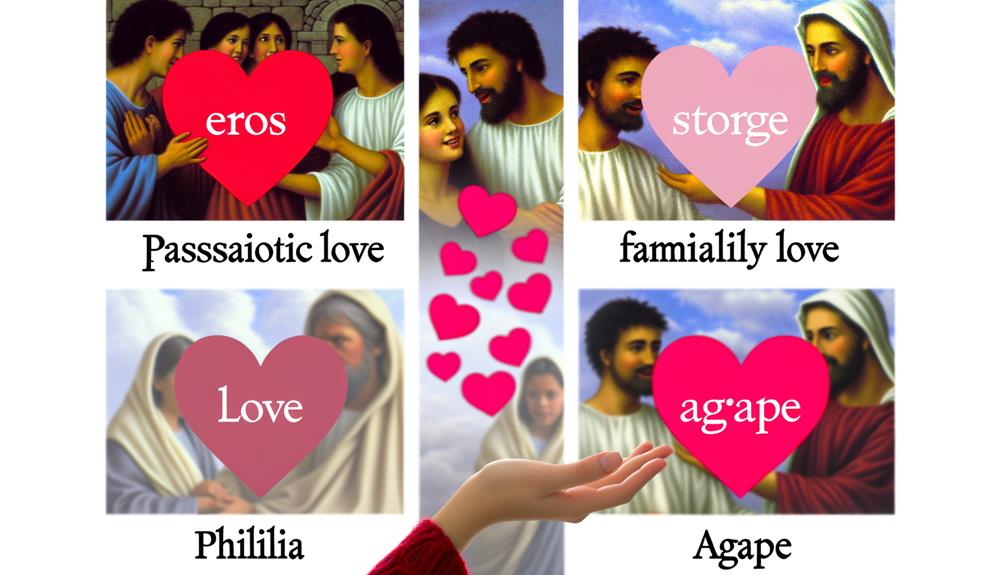
Understanding Eros in contrast to other forms of love, such as agape, philia, and storge, reveals the multifaceted nature of love as depicted in the Bible.
Eros, characterized by romantic and passionate love, often focuses on physical attraction and emotional connection.
In contrast, agape represents unconditional, selfless love, mirroring God’s love for humanity.
Philia, or brotherly love, emphasizes companionship and mutual respect, often found in friendships and community bonds. This type of love is characterized by a deep sense of loyalty and support, creating strong connections between individuals who share common interests and experiences. In many cultures, it is celebrated as a vital component of social harmony and personal fulfillment. The ‘philia love definition in scripture‘ highlights the importance of camaraderie and compassion, illustrating how such relationships can enrich our lives and foster a sense of belonging.
Storge, the love within families, highlights natural affection and duty among kin.
Biblical Passages on Romantic Love
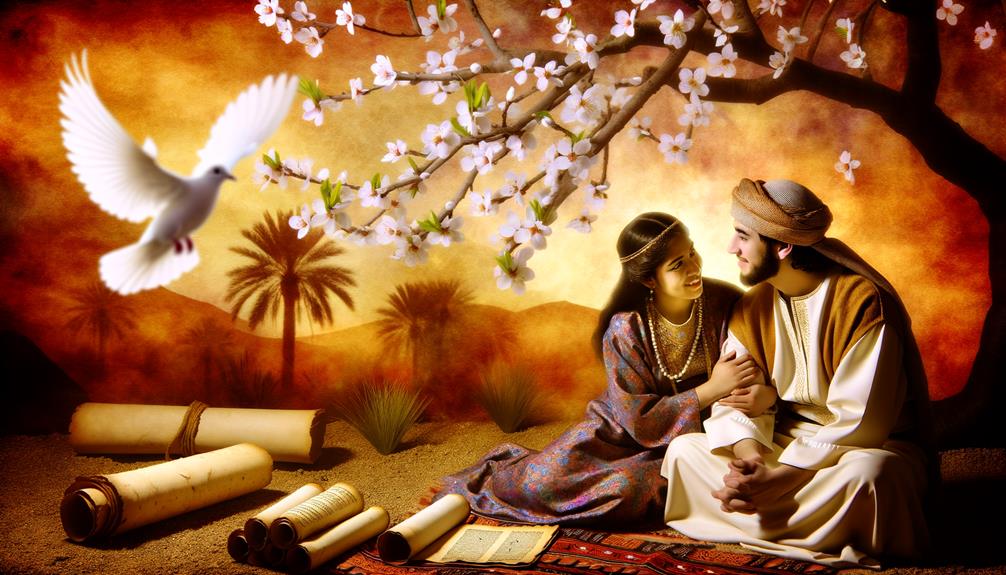
When exploring biblical passages on romantic love, I find the Song of Solomon offers rich, poetic expressions of eros love, illustrating the deep emotional and physical connection between lovers.
Additionally, the story of Isaac and Rebekah in Genesis provides a narrative account of romantic love blessed by God, emphasizing the importance of divine guidance in relationships.
These texts help us understand how the Bible frames eros as an integral part of human experience while aligning it with spiritual principles.
Song of Solomon
The Song of Solomon, often celebrated for its poetic beauty, offers profound insights into the nature of romantic love as envisioned in the Biblical context. I find it fascinating how this book presents love not merely as an emotion but as a multidimensional experience that encompasses:
- Mutual admiration: The lovers consistently praise each other’s physical and inner qualities.
- Desire and longing: There’s a palpable sense of yearning and anticipation between the lovers.
Theologically, the Song of Solomon reveals that romantic love can be a sacred reflection of God’s love.
Contextually, it speaks to the value of treasuring and nurturing romantic relationships.
Isaac and Rebekah
Drawing from the story of Isaac and Rebekah, we see a profound example of divinely orchestrated romantic love in the Bible. Abraham’s servant, guided by God, finds Rebekah as a suitable wife for Isaac, fulfilling Abraham’s desire for continuity and divine blessing.
This narrative emphasizes faith and divine providence in romantic relationships. When Isaac first sees Rebekah, he loves her deeply, indicating a love that goes beyond mere physical attraction, rooted in God’s will.
Their marriage stands as an exemplar for those seeking to serve others, demonstrating that true love aligns with divine purpose. This story reminds us that eros love, when guided by faith, can be a powerful force for good in fulfilling God’s plans.
Eros and Marriage
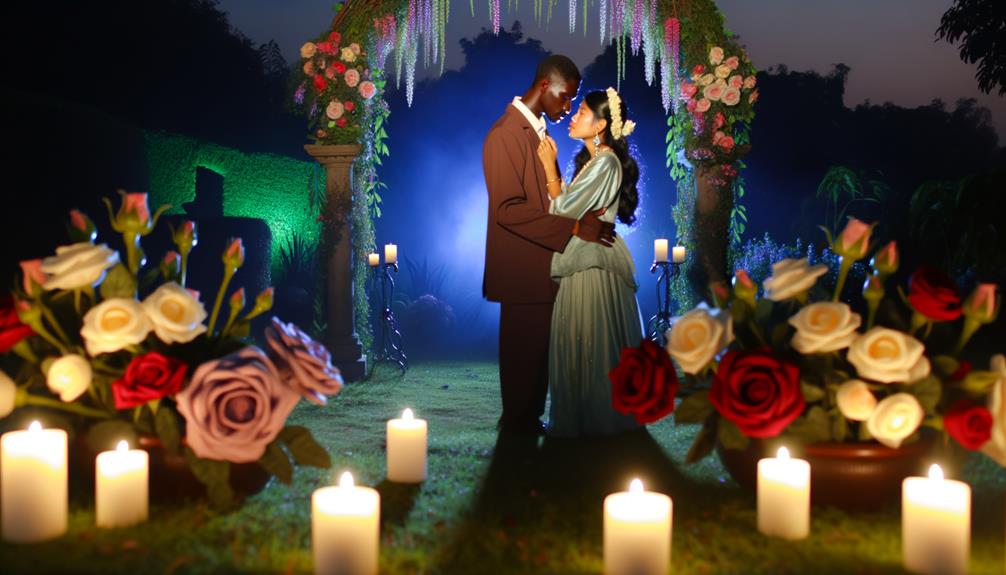
Eros, characterized by its passionate and intimate nature, plays an essential role in the theological understanding of marriage within the Bible. This form of love, deeply rooted in physical attraction and desire, isn’t merely about carnal pleasure but serves a higher purpose in a marital context.
It fosters:
- Unity: Eros binds spouses together, creating a strong, intimate connection.
- Procreation: It drives the continuation of family lines and community growth.
Through these aspects, Eros underscores the sanctity of marriage, aligning with divine intentions.
Spiritual Implications of Eros
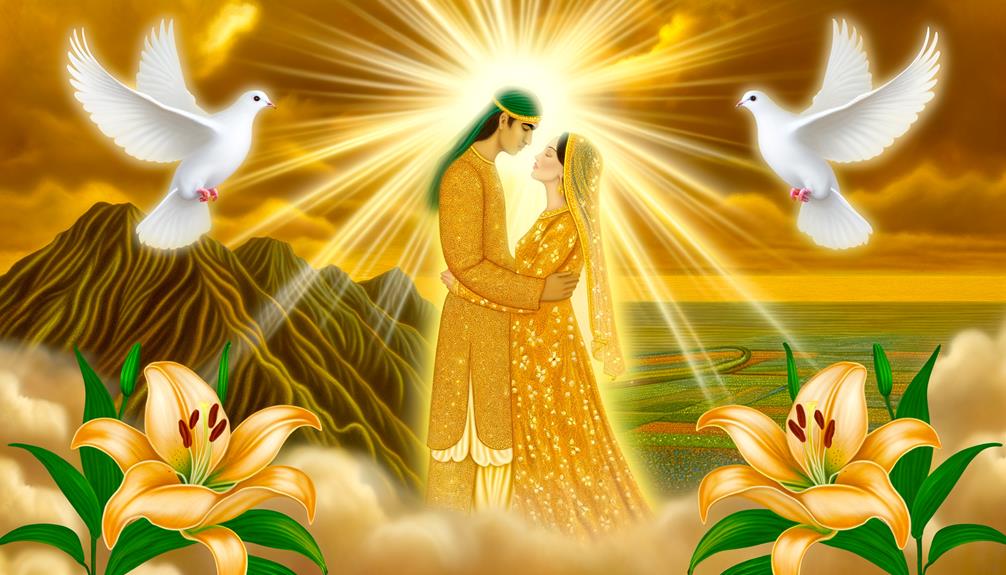
Understanding the spiritual implications of Eros reveals how this passionate love transcends mere physical attraction to embody a deeper, divine significance within the framework of biblical teachings.
Eros, when aligned with God’s intentions, reflects the profound union between Christ and the Church. It’s a love that calls us to see our partners as divine creations, deserving of respect and selfless care.
This perspective transforms Eros into a sacred act of worship and service, emphasizing mutual edification and spiritual growth.
When we approach Eros with a heart inclined towards God, we honor Him through our relationships, fostering a love that’s both fervent and holy, thereby enriching our communal and spiritual lives.
Conclusion
As I probed deeper into the Bible’s portrayal of eros, I couldn’t help but feel a sense of awe.
How does this passionate love fit within the sacred texts? It’s more than just romantic—it intertwines with divine purpose, marriage, and spiritual growth.
The Bible doesn’t merely acknowledge eros; it elevates it, urging us to see it as a sacred bond.
So, are we ready to embrace eros not just as a feeling, but as a divine calling?






